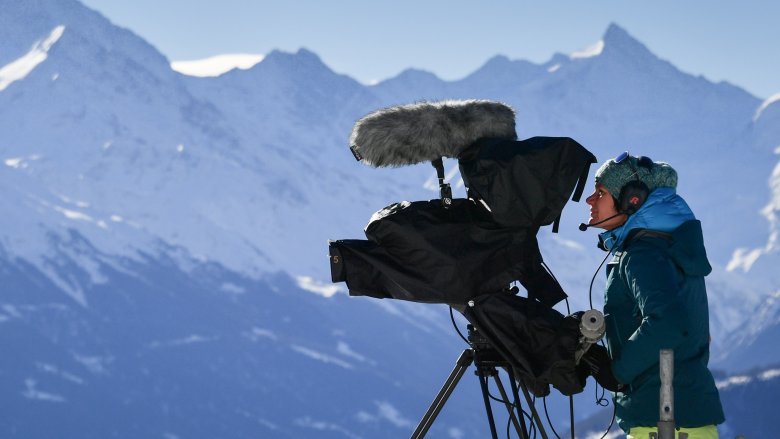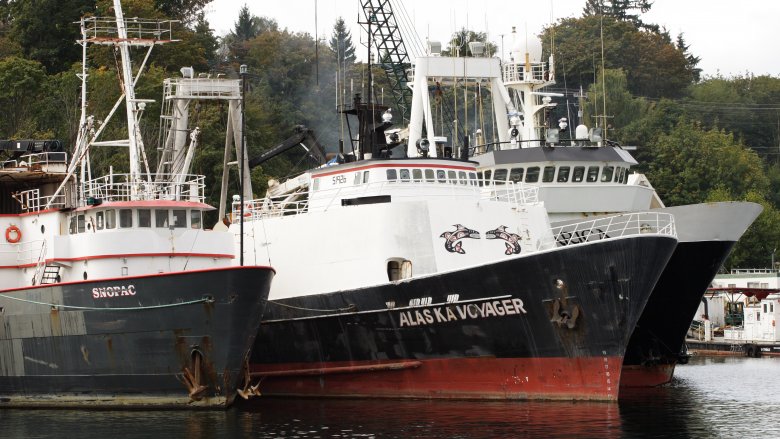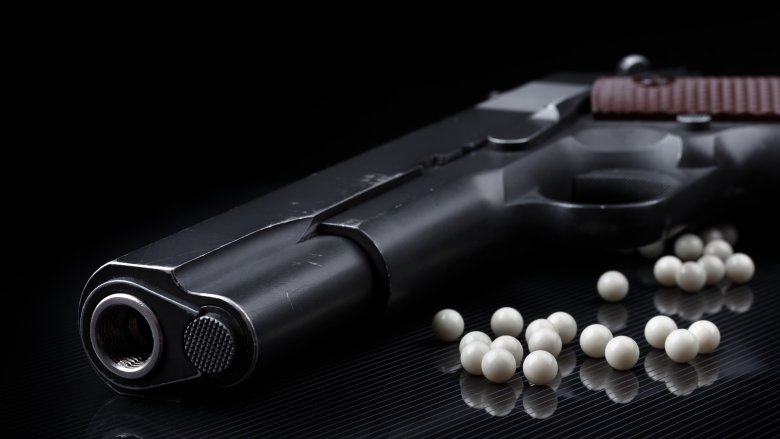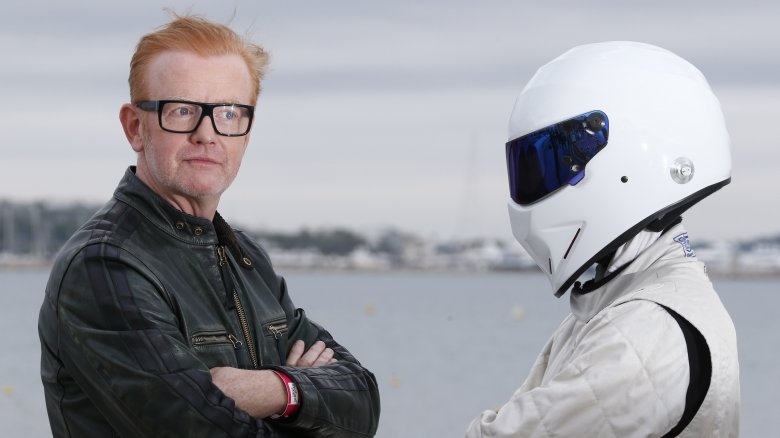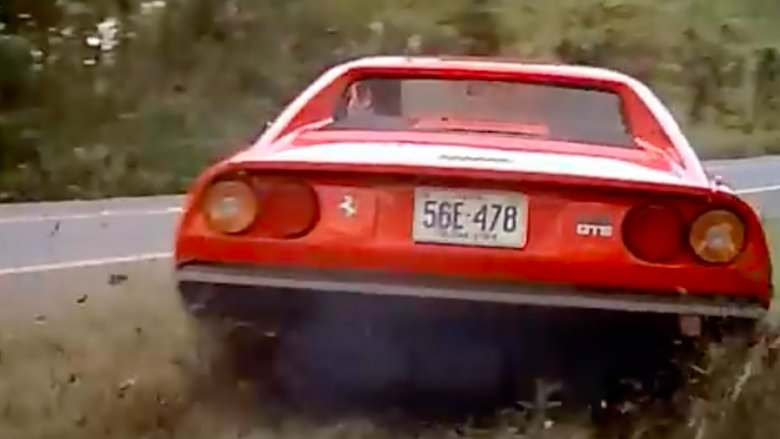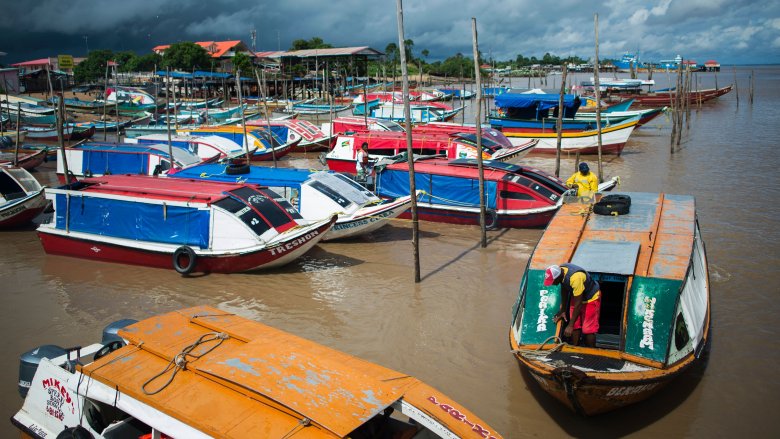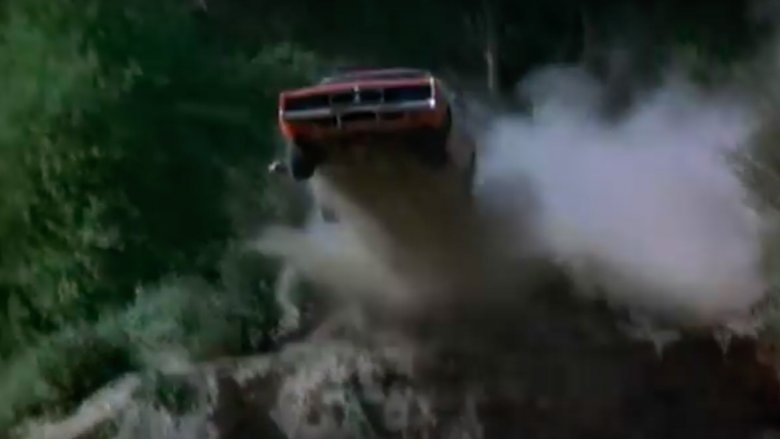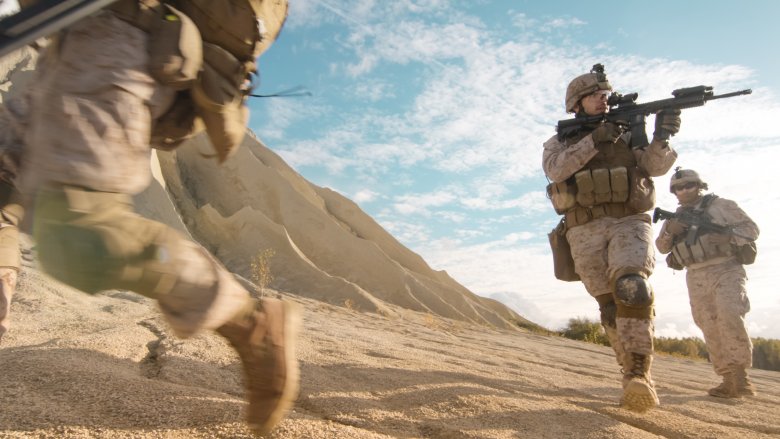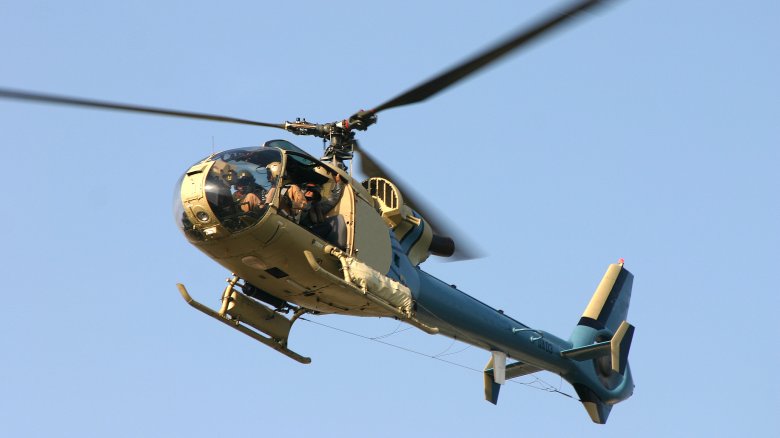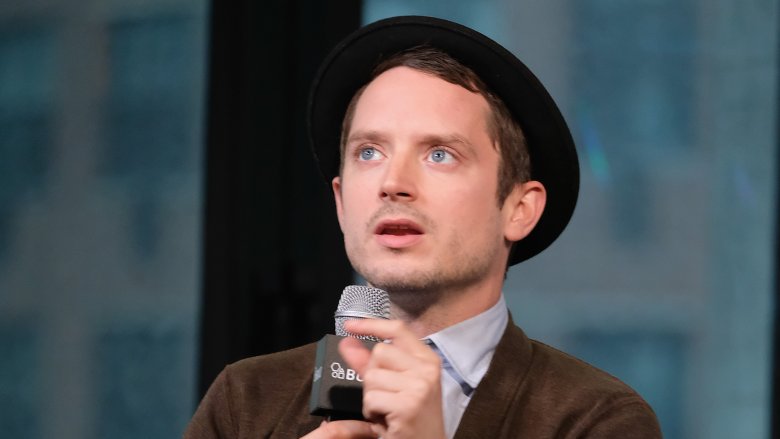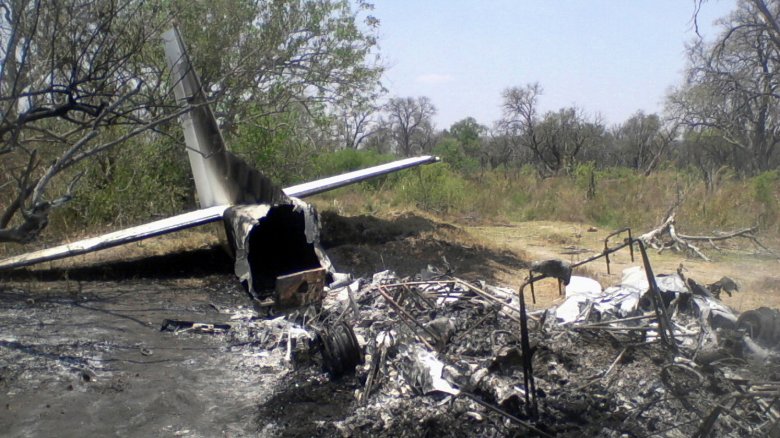Shows That Put Their Camera Crews In Terrible Danger
Oh, reality television. Glorious reality television. We do so love to see other humans in mortal peril and embarrassing situations, eating gross things, and generally being jerks to one another. And sometimes we forget that for every person who is alone in the woods fighting for survival, there are a bunch of camera people following him around 24 hours a day, so you know, he's not actually alone, and technically, he could ask them for a bag of chips or something if he got really hungry. But still.
Good TV is TV that puts people in difficult situations, whether it's happening for real or it's recreated from a script. Either way, it's not just the actors and stunt people who are in danger, it's the camera crew, too. In fact, stunt people are better protected from the hazards of their profession than camera people are. When you're a stunt person, you've got a helmet to protect you when your out-of-control vehicle goes careening toward the camera crew. If you're a camera person, you've got to choose which direction to jump when that out-of-control vehicle is careening in your direction. That's why camera crew are killed in the line of duty four times as often as stunt people are. And sometimes, those deaths are entirely preventable, and the shows are entirely at fault. But who's pointing fingers? Besides the lawyers.
Deadliest film job
Crab fishing is super dangerous, which is why people love watching it happen from the comfort of a very dry, stable living room. That way we can all experience the mortal peril with none of the mortal peril. It's a win-win for everyone except the people on the boat, and the camera crew who probably had no idea what they were signing up for until the ink on the contract was already dry, and now it's hell on the high seas all day, every day. Let's hope Dramamine is a job perk.
There's no reason to believe the camera crew on Deadliest Catch is any safer than the people they're filming, in fact it's probably fair to say camera crews are in greater danger because they have no idea what they're doing. In an interview with the Riverfront Times, Deadliest Catch star and crab boat captain Andy Hillstrand said camera operators are constantly getting injured on the job: "They've broken ribs, broken arms, broken legs. They fall in open holes or a wave will knock them down and roll them around." Captain Sig Hansen said he once saved a cameraman from getting crushed by a 900-pound crab pot. And one cameraman broke his jaw in three places when he tripped and fell onto a crab pot, then he boarded the boat the next day for weeks of similar abuse at sea. So good times all around. Maybe painkillers are a job perk, too.
Look out, he's got an airsoft gun
If you're going to follow a bunch of cops around with a camera and film dangerous criminals, you're probably aware of the dangers of your occupation. Yes, being a Mount Everest Sherpa might be slightly more dangerous than filming Cops, but unless you've told your mom there's nothing to worry about so many times that you're actually starting to believe it, you almost certainly understand just how hazardous your profession is.
Soundman Bryce Dion was killed in 2014 during a shootout at a Wendy's in Omaha, Nebraska. The suspect was attempting to rob the restaurant with an Airsoft gun, which granted does look just like a real gun though anyone who's used one knows it doesn't sound like a real gun. But anyway, the suspect fired his Airsoft gun and the police fired back. Dion was caught in the crossfire — a stray bullet from an officer's gun hit him in the armpit above his bulletproof vest and killed him. Omaha's chief of police told a local news station that Dion "paid the ultimate price for his service to provide the footage of the real-life dangers that law enforcement officers face on a daily basis," which couldn't have been terribly comforting for his family, since what really happened is that Dion paid the ultimate price to provide footage for a junky reality TV show that does some ethically questionable things, but you didn't hear that from us.
When getting run over is an occupational hazard
Top Gear is unabashedly testosterone-fueled mantainment, and it should come as no surprise that the show regularly puts the lives of its camera crew at risk. First there was the 2016 rumor that Matt LeBlanc nearly ran over a cameraman who was trying to get a low shot on the side of the track, but that's fairly tame compared to the helicopter that crashed while racing a Corvette on Top Gear Korea or the whole "doughnuts at Chernobyl" thing, which Huffington Post called "one of TV's most tasteless ever hours."
Besides the obvious dangers of careening cars and radioactive dust, show-runners love to be really outrageous, because outrageous attracts viewers, even in the U.K. where drinking coffee instead of tea is generally considered the most outrageous choice a civilized person might make. And we're totally allowed to make fun of English blokes right now because one of the more outrageous things Top Gear has done involved driving through the southern United States in cars painted with slogans that were virtually guaranteed to make certain populations bright red with rage. Predictably, "Man love rules OK?" and "Country and Western music is rubbish" got a bunch of rifle-toting yokels worked up, the Top Gear crew was pursued by rock-throwing guys in pickup trucks, and most of the action didn't end up on the show because the camera operators were all running for their lives. True story.
Dangerous footage
Helicopters and airplanes are often a part of television and movie production, whether it's shooting aerial footage or just ferrying cast and crew around difficult terrain. At any rate, flying comes with its own set of hazards — in fact according to Deadline, helicopter crashes are responsible for more Hollywood deaths than any other sort of on-set accident. Between 1980 and 2014, 33 people working on movies and television were killed in helicopter accidents, which works out to an average of roughly one person each year.
Now it is true that most of these accidents happened in the '80s, which was a bad time for both hairstyles and film and TV-related helicopter crashes. There were 26 crashes in that decade alone, including one on the set of the popular television series Magnum P.I. The Magnum helicopter was flying low, which is what pilots often have to do so film crews can capture the most dramatic footage. The crash killed a cameraman and injured the pilot, who ended up with the rather lenient punishment of losing his license for 90 days.
Fortunately, modern film crews can obtain dramatic, low-flying footage with unmanned drones, so these types of accidents are no longer common. But drones are their own kind of hazard. Privately operated drones have been known to crash into airplanes and helicopters, malfunction over crowds, and just randomly attack people because they are sentient and probably also evil. But at least that's a separate problem.
Maybe you shouldn't get on a boat with that guy
So you looked into joining a crab boat camera crew and it wasn't exciting enough for you. Too many refreshing waves hitting you in the face and holes to fall down like Disneyland's most sucky ride ever if it went on for six months instead of three minutes. So how about a film job in Guyana, where you might get dumped into piranha-infested waters by a half-blind boat captain whose favorite movie franchise is The Fast and the Furious?
According to the LA Times, 41-year-old Monica Martino, co-executive producer of Bamazon (a show about unemployed construction workers looking for gold in Guyana), said she and her crew got thrown into a river at high speed when the pilot of their boat turned too fast. Martino was pulled back aboard, only to get thrown onto the deck when the boat crashed into a tree. She suffered a concussion, a torn shoulder, and bruised ribs. And if that wasn't enough, she waited nearly a day for medical care because there was no evacuation plan in place in case of an emergency.
Unfortunately, ratings supersede safety, so many shows are taking more and more risks to provide viewers with the sensational programming they crave. And when accidents happen in foreign countries, the Occupational Safety and Health Administration has no jurisdiction, so workers who sign on for jungle expeditions are basically on their own. Moral of the story: Don't carry the camera on a jungle expedition. That's all.
The Dukes of Hazzard
Everyone's favorite redneck action-comedy was not as much wholesome good fun behind the scenes as it was on the small screen. In the summer of 1981, the family of Dukes of Hazzard cameraman Rodney Mitchell sued the Ford Motor Company and the show's producers after a camera car flipped over, crushing Mitchell to death and injuring several of his colleagues. Tragically, it was also Mitchell's last day on the job. According to People Magazine, on the day of his death he'd told a friend, "I have to get off this show before it kills me."
Unsurprisingly, The Dukes of Hazzard was one of the more hazardous shows of its time — on average, 150 police cars and 100 hot rods were destroyed in any given season. At the time, stunt coordinator Paul Baxley defended the show's safety record by saying something to the effect of "no stunt people were harmed in the making of Dukes of Hazzard," which must have been particularly upsetting for Rodney Mitchell's family, since he was not a stunt man but ended up dead anyway. But hey, no stunt men were harmed, so at least Paul Baxley was free of blame. Priorities.
Crab boats are starting to sound pretty good
When you take a job on the camera crew of a show like Top Gear, you have a reasonable expectation of safety. It might not be realistic, but it's certainly reasonable. If you take a job on a camera crew in a war zone, you probably don't give your kids a quick peck on the cheek as you head out the door on your way to work. You say some real goodbyes because you really don't know if you're going to be coming home again.
Now, it's hard to say news programs are being negligent because reporters and camera people know exactly where they're going and basically what they'll find when they get there. Deaths happen all the time. According to the LA Times, in 2006 a CBS camera crew died in a Baghdad bombing, and just a year after that a U.S. helicopter attack killed a Reuters camera crew and 10 other people.
On a scale of 1 to totally senseless death, journalist deaths in war zones rank pretty high up there. They shouldn't, because journalists go to these places because they want the public to know what's happening in there. But as wars drag on, people kind of stop caring. "We have come to the conclusion that no one knows we are here," one correspondent in Baghdad wrote, which makes those deaths all the more sad and senseless.
Just stay out of helicopters
Now, most job applications for reality television crewmembers probably don't explain the history of on-set helicopter crashes, so people continue to sign up for these jobs. In 2013, a cameraman, cast member, and pilot were all killed in a helicopter crash during the filming of a Discovery Channel military-themed reality show with the working title Lone Operator. According to the LA Times, the helicopter was flying low to the ground when it hit a slope and crashed, killing everyone on board.
Lawsuits that followed the accident claimed the pilot was "incompetent or unfit to operate the helicopter." Records indicated that he'd had his license suspended twice, once after flying into a power line while filming an episode of Ripley's Believe It or Not! The crash was called "the deadliest accident on a film set in Southern California" since a 1982 accident on the set of Twilight Zone: The Movie that killed an actor and two children.
Discovery settled the lawsuits out of court, but critics say the incident highlights a need for greater safety precautions in reality television, which accounted for nearly one-third of all film- and TV-related fatalities between 2010 and 2015.
Dirk Gently's hospitalized cameraman
Death makes the headlines but we hear less about injuries that weren't fatal, which makes it seem like on-set accidents are freak occurrences that just aren't very common, like shark attacks or people who think Full House really needed a reboot. But on-set accidents don't have to take lives to still be considered a serious problem. In 2016, a camera operator was injured on the set of a BBC series starring Elijah Wood. The crew was filming a stunt involving an SUV when the driver got a little too close to the camera crew and hit a 55-year-old camera operator. According to The Hollywood Reporter, the cameraman's injuries were serious "but not life-threatening," which is way better than being dead and somewhat worse than not getting hit by an SUV in the first place.
To add insult to injury, the show, titled Dirk Gently's Holistic Detective Agency, only lasted two seasons before the BBC canceled it, probably because of the crappy ratings. Well, at least the unfortunate cameraman didn't have to give his life for a show no one really wanted to watch. So that's something.
It was right there in the name
And because we can't wrap this whole tale of death, despair, and one-eyed boat captains without throwing in some horrible, horrible irony, in 2013 camera crews were working on a Discovery Channel reality series entitled Dangerous Flights, featuring a "daring team of cowboy pilots" who ferry second-hand aircraft from one part of the world to another. According to the LA Times, 30-year-old cameraman and director John Driftmier was shooting aerial footage in Kenya when his plane crashed, killing both him and the pilot.
The accident happened after one of the subject planes had been safely ferried to its destination — Driftmier decided he wanted additional footage, so he hired another airplane to take him up one more time.
Some comfort can at least be taken from the fact that many of the people on this list died or were injured doing work that they love, but for every crab boat, Amazonian jungle, race track, and robbery in progress at a Wendy's restaurant, there's a job filming an episode of the Late Show with Stephen Colbert or The Big Bang Theory, where things mostly don't crash into you, flip over on you, or chase you in a pickup truck. So if you're considering a career as a filmmaker, maybe try to go for one of those jobs that are mostly safe and indoors, and keep your fingers crossed that reality shows will eventually go the way of The Dukes of Hazzard.
